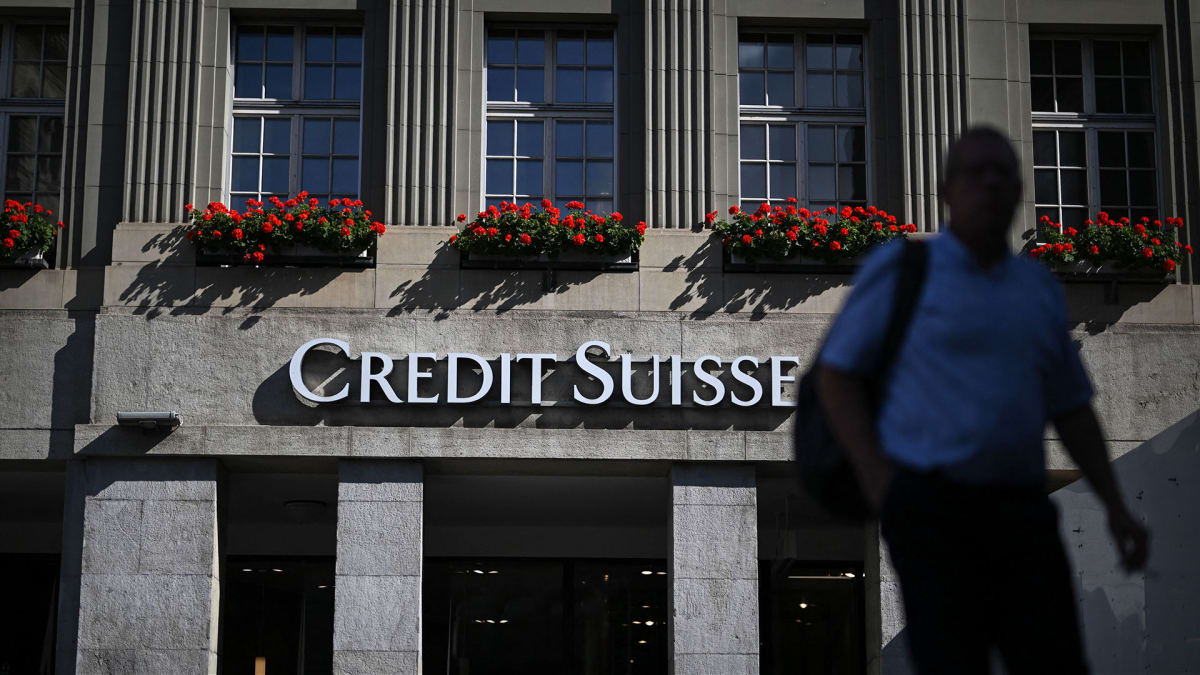
It is unclear whether this is the contagion effect of Silicon Valley Bank.
The shutdown of the Californian bank, a major player in the ecosystem of startups and small businesses, on March 10, sent shockwaves around the world.
It has awakened fears about the financial sector and more particularly about the solidity of banks throughout the world.
These fears were heightened by the March 12 closure of Signature Bank in New York. While U.S. regulators have announced an emergency plan to guarantee all deposits, even those above $250,000 -- the limit before the announcement -- concerns remain.
They relate in particular to the American regional banks, which are less regulated and are less diversified.
Credit Suisse Shares Fall Almost 30%
But concerns seem to have crossed the Atlantic Ocean since all eyes are now on Credit Suisse. The Swiss bank has been in difficulty for several months and is trying to revive itself.
Things were made worse on March 15 when its largest shareholder indicated they would no longer invest in the bank.
Saudi National Bank Chairman Ammar Al Khudairy was asked by Bloomberg TV on March 15 whether his company was open to further injections if there was another call for additional liquidity.
"The answer is absolutely not, for many reasons outside the simplest reason, which is regulatory and statutory," Al Khudairy said, definitively ruling out the possibility.
Saudi National Bank, which is 37% owned by the sovereign wealth fund of Saudi Arabia, became the first shareholder of Credit Suisse as part of a capital increase operation at the end of last year.
Saudi National bank had acquired 9.9% of the capital in exchange for an investment of 1.4 billion Swiss francs. But in just a few months, the value of this stake has already diminished by $500 million.
These remarks caused a fall of nearly 30% in Credit Suisse shares to 1.65 Swiss francs on the Zurich Stock Exchange.
Credit Suisse's one-year credit default swaps (CDs), a form of insurance for bondholders, hit a record high of 1,200 basis points, according to data from S&P Market Intelligence. This means that investors holding the bank's debt have to pay a lot more to insure themselves for the event that Credit Suisse cannot repay them. When the cost of CDSs rises sharply, it suggests that investors clearly doubt that the company will be able to honor its debts.
'That's Not the Topic'
It is in this context that the Chairman of the bank Axel Lehman was asked about possible assistance from the Swiss government during a Financial Sector Conference in Saudi Arabia on March 15.
Lehman began by dismissing the comparison between Credit Suisse and SVB, saying his bank was regulated compared to its US counterpart. When asked if he would rule out some sort of assistance from the Swiss government, Lehman said that "That’s not the topic.”
"We are regulated, we have strong capital ratios, very strong balance sheet. We are all hands on deck. So that’s not the topic whatsoever," Lehman said, insisting that the prospect of a government aid is "not a topic whatsoever.”
The banker repeated that Credit Suisse had already taken "the medicine" to tackle its problems. Lehman referred to the emergency plan announced last October by Credit Suisse.
Last October, it launched an emergency plan considered by many analysts and the markets as the last chance plan.
This plan focused on the asset management business. The firm wants to cut 9,000 jobs by 2025 in an effort to reduce its cost base by 14.5 billion Swiss francs in three years.
It is also planning to break up the investment bank into three parts. The investment bank was once the company's cash cow, but a series of scandals have cost Credit Suisse several billion dollars in losses and fines imposed by regulators.
The company is also selling a "significant portion" of its Securitized Products Group business.
The bank has suffered setback after setback since March 2021 and the bankruptcy of Greensill Capital, a specialized lender with links to former U.K. Prime Minister David Cameron.
The British company, which was founded in 2011 by the financier Lex Greensill, was a supply chain and accounts receivables lender, that specializes in lending money to companies so that they can pay their suppliers. It then packaging the debts of these companies into financial securities, which it resold to investors.
The house of cards began to crumble when these investors, including Credit Suisse, had doubts about the real value of the debts and abandoned Greensill, which then filed for bankruptcy in March 2021.
Credit Suisse invested $10 billion of its clients' capital in Greensill products.
This bankruptcy marked the beginning of a series of scandals that tarnished Credit Suisse's reputation and weakened it.
Last month, the Swiss Financial Market Supervisory Authority FINMA said that Credit Suisse "seriously breached its supervisory duty to adequately identify, limit and monitor risks in the context of the business relationship with Lex Greensill over a period of years."






